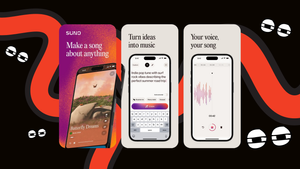Suno, the music AI company recently sued by the major labels for copyright infringement, has launched its first mobile app.
CEO Mikey Shulman announced the release, saying he is “THRILLED” to launch the app, while also bragging that Suno’s generative AI tool would now be “in your pocket wherever inspiration should strike”. Providing that you’re using an iPhone and you’re in the US that is - although an Android app and global rollout are both promised.
That’s also assuming that the litigation launched by the labels does not ultimately destroy the AI business. Although for now, ironically, the record industry’s legal action and the resulting media coverage has, if anything, provided something of a profile boost for Suno. Which is similar to what happened in the early 2000s when the labels started suing file-sharing platforms.
In a blog post bigging up the launch, Shulman emphasises Suno’s ambitions, saying, “We’re on a mission to build a future where everyone can make and share music. We prize originality, both in how we build our product and in how people use it”.
In terms of what can be done with the iOS app, Suno says users can “make songs from text”, “record audio with your phone and turn it into a song” and “listen to and curate music you love from other creators”.
Suno, and rival music AI platform Udio, are both accused of training their respective generative AI models with large quantities of existing music without getting permission from any copyright owners in the music industry. Which, as far as the record labels are concerned, is copyright infringement.
The two AI companies have been vague about what music has been used in their training processes. Udio also suggested its AI ‘listens’ to rather than copies music, while Shulman accused the labels of failing to understand how Suno’s AI works, arguing that they are simply reverting “to their old lawyer-led playbook”.
If the lawsuits against the two companies get to court, it is likely Suno and Udio will argue that AI training is fair use under US copyright law and therefore permission from copyright owners is not required.
Another narrative being pushed by both AI companies is that they are all about enabling the music creators of the future, and are now having to fight the litigious corporates of the music industry in order to continue doing so.
The labels have pushed back against that - arguing that artists are as angry as labels about their music being exploited by AI companies without permission - but Shulman nevertheless continues that narrative in his blog post.
“Twelve million people so far have used Suno for self-expression, connecting, teaching and fun”, he writes. “Suno is built for new music, new uses and new musicians. We’re excited to be in your pocket whenever the moment strikes, and to provide a rich set of tools for capturing it”.

